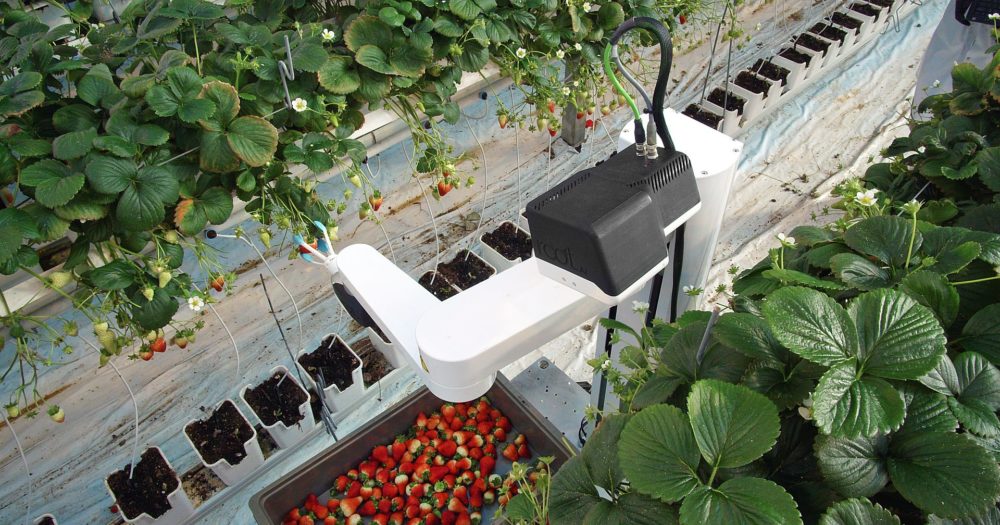Covid-19’s onset in the US coincided with one of the most important seasons on specialty crop farms across the country: harvest. As labor shortages and uncertainties surrounding the H2A visa program — and other pandemic-related factors — hit growers with a curveball, Root AI CEO Josh Lessing saw a prime opportunity to take his ag robotics startup to the next level.
“The motivation for this round was commercial, in that we have been putting together customer contracts for a bit and getting ready to deploy our technology into paid commercial operations,” he told AFN.
The Boston-based startup has closed a $7.2 million seed round from new and existing investors including PJC general partner Rob May, First Round Capital partner Josh Kopelman, angel investor Jason Calacanis, Outsiders Fund managing director Austin McChord, Accomplice, and AgFunder [disclosure: AgFunder is AFN’s parent company.] The round was closed remotely amid the pandemic and oversubscribed.
Root AI is developing artificial intelligence and robotics to support the indoor and greenhouse farming sector. Its harvesting robot, named Virgo, is designed to be dexterous and harvest the same way a human would. Lessing referred to Virgo as a “cross-crop robot,” with its ability to harvest multiple varieties differentiating it from competing agbots.
“We made a simplifying assumption that through environmental structuring and genetics, crops are designed to be maintained, cared for, and harvested by people. We built a robot that has that biomimicry that allows the robot to work on a variety of different crops,” he said.
Given the delicate nature of many specialty and vegetable crops like strawberries or cucumbers, ensuring that a robot will be nimble enough to handle the produce without damage, while harvesting them efficiently, is a big ask.
Root AI has been testing Virgo on strawberries, cucumbers, and tomatoes at greenhouses throughout North America and Europe.
Watch Virgo in action:
The startup is also offering its robot fleet as a service in lieu of selling them directly to growers. It gets paid for each bot’s work on a piece-rate basis, which is how human workers are often recompensed. This has proven to be an easier starting point for the conversation with growers about the value that robots can add.
“It’s an apples-to-apples comparison to what they do now and a great way to begin a discussion about a new kind of technology. It’s how they think about the job already,” Lessing said.
Accelerating adoption
Interest around automating various aspects of agriculture is nothing new. But the conversation has reached new heights as Covid-19 exposes weaknesses in the supply chain and raises issues around worker safety. In June, AgFunder hosted a webinar with Lessing and Igino Cafiero, founder of ag robot startup Bear Flag Robotics, to discuss how the pandemic is changing the state of play for their technologies.
“This is a unique moment for the field of ag robotics in that a lot of growers are going to seek automation in their operations. It’s accelerated things a great deal,” Lessing said.
How are agrifoodtech startups responding to Covid-19? Find out here
The robotic harvesting sector was worth an estimated $5.5 billion in 2018 based on interest from early adopters. Unsurprisingly, Root AI is not alone in its aim to automate harvesting for growers. Examples include Denver-based Tortuga AgTech, which came out of stealth in January, and California’s Advanced.Farm – both of which offer robotic strawberry harvesters.
The pandemic will likely drive more wait-and-seers to become early adopters, Lessing added. Virgo is designed to operate in greenhouses, which has the added bonus of providing a market of growers who are already tech-savvy.
“They are already familiar with incorporating automation throughout all processes. Like any other industry, there are early adopters who have advanced tech in every aspect of their operation.”
“I’ve worked in automation in different categories like manufacturing, processing, and warehousing [and] there is always a delineation between early adopters and late adopters. It’s not unique to agriculture.”





